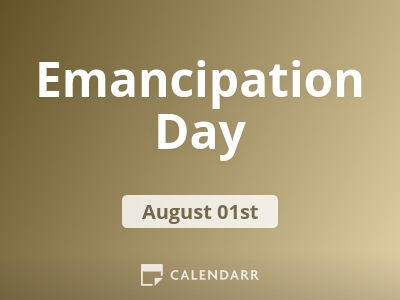- Calendar
- Calendar 2026
- August
- Emancipation Day
Emancipation Day
Emancipation Day is observed in Canada on August 1 to mark the date in 1834 when the Slavery Abolition Act took effect throughout the British Empire, including the territories that would become Canada.
This landmark legislation freed more than 800,000 enslaved Africans and their descendants.
Origin of Emancipation Day in Canada
Although not a statutory holiday in most provinces, Emancipation Day is recognized across the country as a time of reflection and education.
On March 24, 2021, the Canadian House of Commons voted unanimously to officially designate August 1 as Emancipation Day.
The day is particularly significant for Black and Indigenous communities, who endured slavery on Canadian soil.
Many Canadians are still unaware that slavery existed in Canada, and Emancipation Day offers a critical moment to acknowledge this truth and honour the resilience of those who resisted.
History of Slavery in Canada
Slavery in Canada began during the early years of European colonization.
From 1671 to 1831, an estimated 4,200 individuals were enslaved in the areas once known as Novelle-France and later referred to as Upper and Lower Canada.
Shockingly, around two-thirds of these individuals were Indigenous, and one-third were of African descent.
The arrival of British settlers led to a rise in the population of enslaved Africans in Canada.
Many were forced into labour, stripped of their identities, and subjected to horrific abuse.
Despite these brutal conditions, many fought back by fleeing to safer territories like Michigan, Ohio, Vermont, and New York.
After the American Revolution, over 3,000 Black Loyalists who sided with the British arrived in Nova Scotia between 1783 and 1785.
Promised prosperity and land, many instead faced racism, poverty, and harsh conditions.
In 1796, nearly 600 Maroons, formerly enslaved people from Jamaica, were exiled to Nova Scotia after rebelling against colonial rule.
Though some helped construct fortifications and formed militias, the majority eventually requested to leave and relocated to Sierra Leone in West Africa.
Following an 1793 act in Upper Canada that restricted slavery and declared freedom for any enslaved person who entered the province, Canada became a beacon of hope.
From the early 1800s to 1865, more than 30,000 enslaved African Americans escaped to Canada via the Underground Railroad.
They settled mainly in Ontario, but also in Quebec and Nova Scotia, establishing vibrant communities and churches that still exist today.
Indigenous women and girls were disproportionately affected, often used for domestic work. Of the 4,185 people enslaved in Canada, 2,683 were Indigenous.
Many were captured during colonial conflicts and sold as property, denied any form of basic rights or autonomy.
The British Parliament passed the Slavery Abolition Act in 1833, and it came into force on August 1, 1834.
Although this legislation officially ended slavery in Canada, the freedom it offered was limited.
Children under the age of six were freed right away, but others were required to keep working as “apprentices” for up to six additional years.
Observing Emancipation Day
On Emancipation Day, Canadians are encouraged to learn about the country’s history of slavery and honour the resilience of Black and Indigenous communities.
Events across Canada include public discussions, exhibits, storytelling, musical performances, and community gatherings.
These activities not only pay tribute to those who fought for freedom but also spotlight the ongoing fight against anti-Black and anti-Indigenous racism.
Major cities such as Toronto and Halifax hold parades, music festivals, and cultural exhibitions throughout the first week of August.
Organizations host panels and film screenings focused on Black Canadian history, social justice, and the legacy of slavery.
In schools and libraries, educators introduce resources to raise awareness and promote inclusivity.
Read Emancipation Day In USA.

Other Celebrations
-
Feb 04 Wed
-
Apr 10 Fri
-
Sep 16 Wed
-
Sep 20 Sun
-
Sep 23 Wed
-
Sep 30 Wed

Emancipation Day - Next years
Sunday, 01 August 2027
Tuesday, 01 August 2028
Wednesday, 01 August 2029











